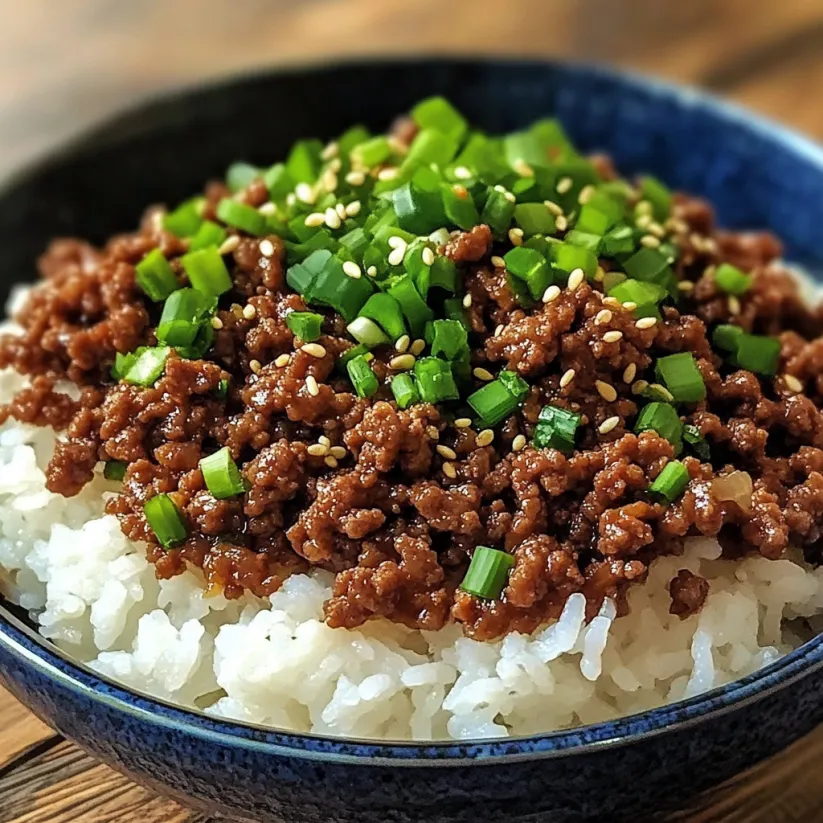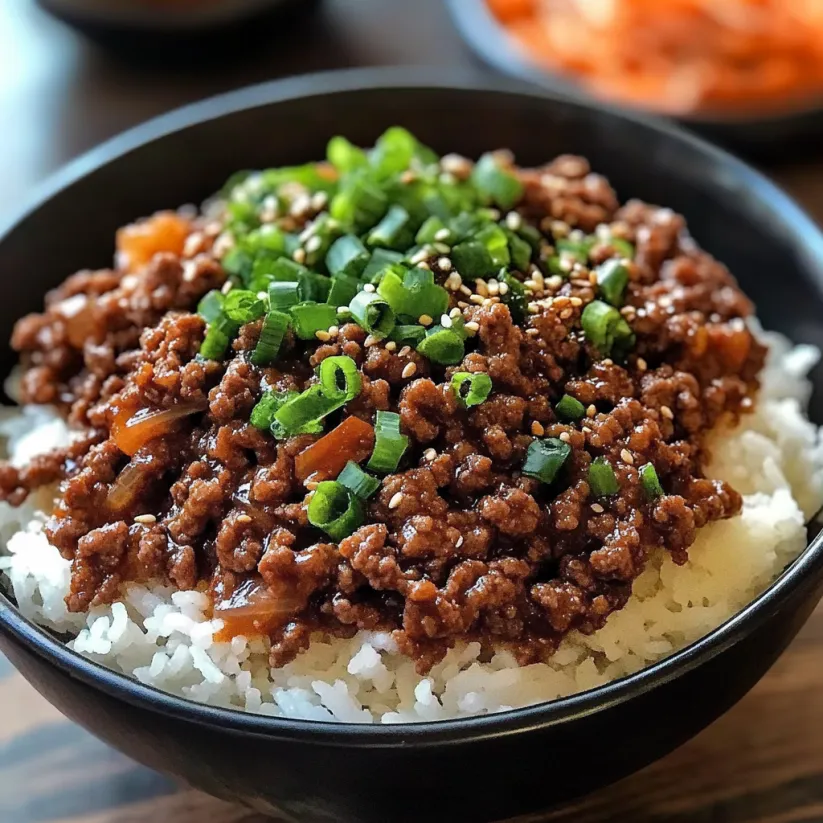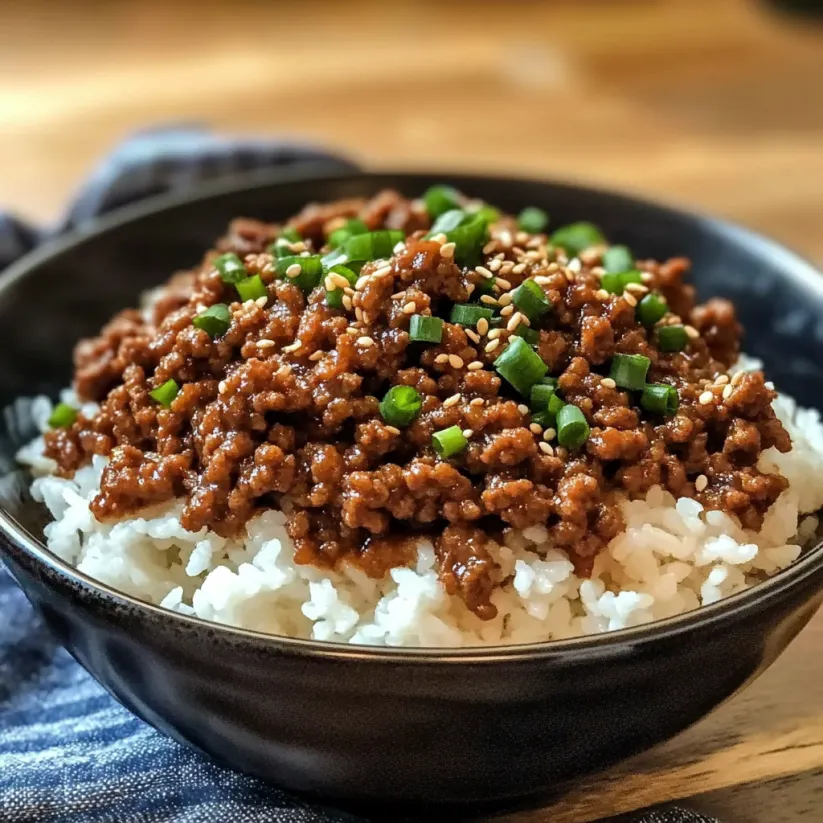 Save Pin
Save Pin
This hearty Korean Ground Beef Bowl has become my weeknight dinner savior when I need something delicious on the table in less than 30 minutes. The combination of savory beef with aromatic garlic and ginger over fluffy rice creates a comforting meal that satisfies even the pickiest eaters in my household.
I first discovered this recipe during a particularly chaotic week when my family needed quick dinners between soccer practice and homework sessions. What started as a desperate attempt to avoid takeout has now become our most requested weeknight meal. My teenagers even ask for it in their lunch boxes the next day.
Ingredients
- 1 pound ground beef 80/20 for optimal flavor balance and juiciness without being overly greasy
- 2 tablespoons soy sauce adds essential umami depth to the dish
- 1 tablespoon sesame oil provides that authentic nutty Korean flavor that cannot be substituted
- 3 cloves garlic minced fresh is always best for the most vibrant flavor
- 1 teaspoon ginger minced look for firm pieces with smooth skin
- 2 green onions chopped they add brightness and a mild onion flavor
- Salt and pepper to taste
- 2 cups cooked rice jasmine rice offers a perfect fragrant base but any rice works
- Optional toppings sesame seeds kimchi pickled vegetables sliced cucumber
Step-by-Step Instructions
- Prepare the Rice
- Cook your preferred rice according to package instructions. For jasmine rice rinse it thoroughly until water runs clear before cooking. This removes excess starch and prevents gumminess. Allow the cooked rice to rest covered for 5 minutes before fluffing with a fork. This resting period helps the rice achieve the perfect texture and allows each grain to maintain its integrity.
- Brown the Beef
- Heat a large skillet over medium high heat until you can feel warmth when holding your hand a few inches above the surface. Add the ground beef breaking it into small pieces with a wooden spoon. Cook for about 5 to 7 minutes stirring occasionally until the meat is no longer pink and has developed some caramelized brown bits for enhanced flavor. Those browned bits are flavor gold so make sure not to rush this step.
- Add Aromatics
- Once your beef is browned drain excess fat if necessary leaving about a tablespoon for flavor. Add the minced garlic and ginger to the hot pan and stir constantly for about 60 seconds. You want the aromatics to become fragrant but not burn which happens quickly with garlic. You should immediately notice the intoxicating aroma that forms the foundation of this dish.
- Season the Beef
- Pour the soy sauce and sesame oil over the beef mixture stirring to coat evenly. Add the chopped green onions reserving some for garnish if desired. Let this mixture simmer for 2 to 3 minutes allowing the beef to absorb all those wonderful flavors. Taste and adjust seasoning with salt and pepper noting that soy sauce already contains salt.
- Assemble Your Bowl
- Start with a generous base of warm rice in each bowl. The rice should be fluffy and steaming. Spoon the seasoned beef mixture over the rice creating an inviting presentation. Add any optional vegetables or toppings you desire arranging them artfully around the beef. Garnish with reserved green onions and a sprinkle of sesame seeds for that finishing touch of color and texture.
 Save Pin
Save Pin
The sesame oil is truly the secret ingredient in this recipe. I once tried to make this dish without it when I ran out and while still good it lacked that distinctive Korean flavor profile. My daughter immediately noticed something was missing proving how essential this aromatic oil is to achieving authentic taste.
Freezer Friendly Meal Prep
This Korean beef freezes beautifully making it perfect for batch cooking. I often make a double batch and portion it into individual containers with rice for quick lunches or dinners. To freeze properly allow the beef to cool completely before transferring to freezer safe containers. Leave a small gap at the top as the food will expand slightly when frozen. Thaw overnight in the refrigerator and reheat in the microwave for 2 to 3 minutes stirring halfway through for even heating.
Vegetable Variations
While this recipe is delicious as written adding vegetables takes it to another level nutritionally and visually. My family enjoys thinly sliced bell peppers and carrots sautéed quickly after the beef is cooked. For leafy greens like spinach or bok choy simply add them during the last minute of cooking and watch them wilt perfectly into the mixture. The vibrant colors create a beautiful contrast against the beef and rice making the meal even more appetizing.
Spice Level Customization
The beauty of homemade Korean beef is controlling the heat level to suit your family preferences. For mild palates the recipe as written provides gentle flavor without significant spice. For those who enjoy heat add 1 to 2 teaspoons of gochujang Korean red pepper paste to the sauce mixture. My husband and I love the spicy version while I make a separate milder portion for our youngest son. You can also serve with sriracha or Korean chili flakes on the side allowing each person to adjust to their preference.
Serving Suggestions
While delicious on its own this Korean beef bowl pairs wonderfully with simple side dishes that complement rather than compete with the main flavors. Consider serving with quick cucumber kimchi quick pickled vegetables or a simple side salad dressed with rice vinegar and sesame oil. For a more substantial meal add a fried egg with a runny yolk on top letting it create a luxurious sauce when broken. The contrast between the hot beef bowl and cool crisp vegetables creates a satisfying textural experience.
 Save Pin
Save Pin
Commonly Asked Questions
- → What type of ground beef works best for Korean beef bowls?
Ground beef with an 80/20 lean-to-fat ratio works best for Korean beef bowls as it provides optimal flavor and juiciness. The fat content helps carry the savory soy, garlic, and ginger flavors throughout the dish. If you prefer a leaner option, you can use 90/10 ground beef, but you might want to add a little extra sesame oil to maintain richness.
- → Can I make this dish with other proteins?
Absolutely! While ground beef is traditional, this dish works wonderfully with ground turkey, chicken, or pork as alternatives. For vegetarian options, you can substitute with crumbled tofu, tempeh, or a plant-based ground meat alternative. Just adjust cooking times accordingly as these proteins may cook faster than beef.
- → What vegetables pair well with Korean beef bowls?
Korean beef bowls are extremely versatile when it comes to vegetables. Traditional additions include spinach, shredded carrots, sliced cucumbers, and steamed broccoli. You can also add bell peppers, mushrooms, bean sprouts, or zucchini. For authentic Korean flavors, consider adding kimchi, which provides probiotics and a spicy tang to balance the savory beef.
- → How can I make this dish spicy?
To add heat to your Korean beef bowl, incorporate gochujang (Korean chili paste) or sriracha sauce to taste. Start with 1-2 teaspoons and adjust according to your preference. Red pepper flakes are another easy addition. For a more complex spicy flavor, add a tablespoon of gochugaru (Korean chili flakes) when seasoning the beef.
- → Is this dish suitable for meal prep?
Korean beef bowls are excellent for meal prep! The seasoned beef maintains its flavor for 3-4 days in the refrigerator. For best results, store the cooked beef and rice separately in airtight containers. When ready to eat, reheat both components and then assemble your bowl with fresh toppings like green onions and sesame seeds. The dish also freezes well for up to 2 months.
- → What can I use instead of soy sauce for a gluten-free version?
For a gluten-free version, you can substitute regular soy sauce with tamari, which is typically gluten-free (always check the label to confirm). Coconut aminos make another excellent gluten-free alternative that adds a slightly sweeter flavor profile. Liquid aminos also work well while providing a similar umami taste to traditional soy sauce.
